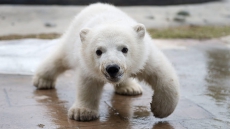OTTAWA — The Harper government is tightening the rules for Canadian expatriates who want to vote in federal elections.
Pierre Poilievre, the minister responsible for democratic reform, has tabled legislation that would require voters living abroad to provide proof of their identity, citizenship and past residence in Canada.
And it would allow them to vote only in the constituencies in which they last lived, putting an end to the possibility of "riding shopping."
The legislation, entitled the Citizen Voting Act, follows a court ruling last spring that struck down a law which stripped expats of their voting rights once they'd lived outside the country for more than five years.
The government is appealing that ruling.
But in the meantime, it is clamping down on the estimated 1.4 million expatriates who've regained their voting rights as a result of the ruling.
"The Citizen Voting Act will help ensure that only citizens vote, that their votes only count in their home ridings and that they show ID to prove both," Poilievre said in a written statement Wednesday.
Poilievre said the proposed new voting requirements for Canadians living abroad are the same as those required of citizens living in the country, who are now required to provide proof of identity and residence before being allowed to cast ballots.
The bill would also attempt to ensure that non-citizens — an estimated 40,000 of whom are on the national voters registry, according to Elections Canada — are not allowed to cast ballots.
It would authorize the minister of citizenship and immigration to provide the chief electoral officer with the names, gender, birthdates and addresses of non-citizens. Elections Canada could then use that information to remove non-citizens from the voters' list.
Ultimately, a spokesperson for Poilievre said, the government remains committed to reinstating the ban on voting for anyone who has lived outside the country for more than five years.
"Our government believes non-residents should have a direct and ongoing connection to Canada and to their ridings in order to vote in federal elections," said Gabrielle Mattey-Renaud.
"For over two decades, Canada's policy has limited to five years the length of time someone can be abroad and still vote. That is fair and reasonable."
The five-year rule was struck down as unconstitutional last May by Ontario Superior Court Justice Michael Penny. The charter of rights is clear that citizenship, not residence, is the fundamental requirement for voting, he ruled, adding that it's not up to the government to determine which citizens are "worthy" to vote.
In a background document accompanying Wednesday's introduction of the Citizen Voting Act, the government argued that Canada is generally more generous to expatriates than other democracies.
For instance, Ireland does not allow non-residents to vote at all, non-resident New Zealanders can only vote if they've lived less than three years abroad, Australian non-residents less than six years and United Kingdom non-residents less than 15 years.






